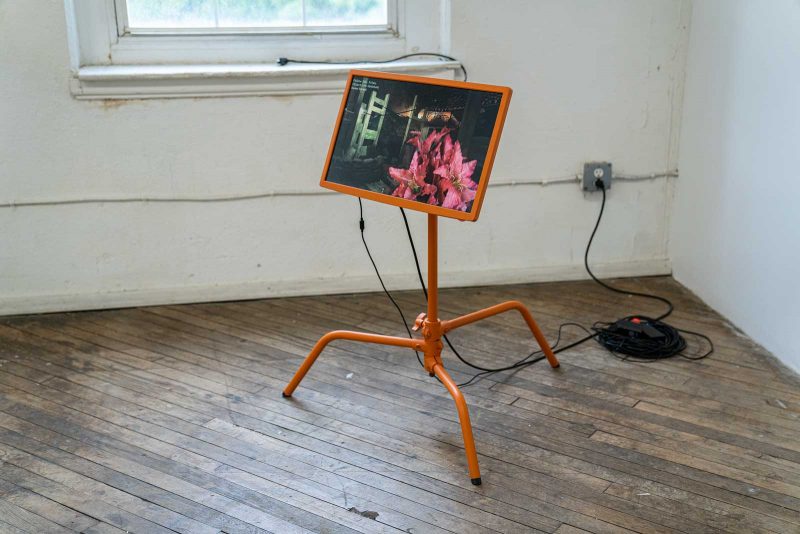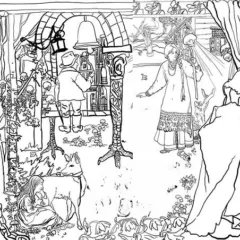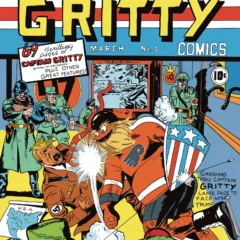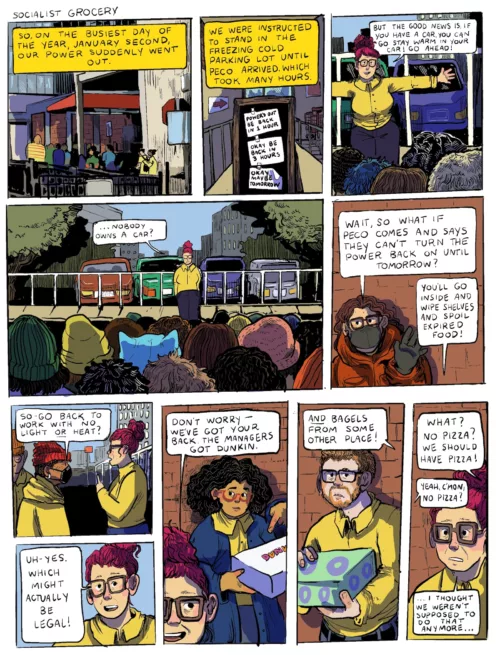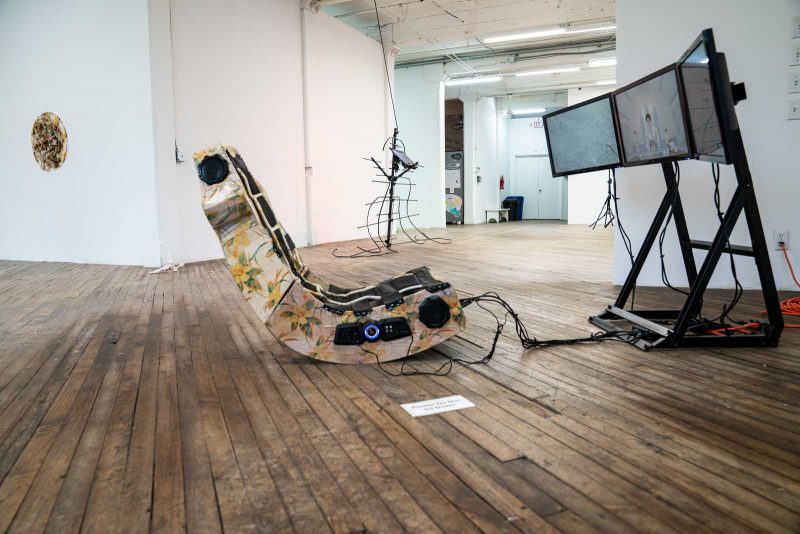
Comedy of Errors, on view in the Commons Space of Vox Populi, presents a haunting collection of work by Shay Arick, Maggie Hazen, and Zach Hill, who are all engaged in various forms of augmentation and modification. The artists reframe examples of masculinity, state violence, and public anxiety through a variety of video and sculptural objects. Foregoing practical solutions to its referenced issues, the work instead produces an encounter that is somewhere between cheeky and mournful.
The gravitational center of the show, Hazen’s “Call of the Lily_1” (2019), arranges a set of three monitors in front of a beaten up, floor-rocking gamer’s chair. The triple-split-screen video weaves together an overwhelming amount of found and created material, but largely centers on a relationship between footage of U.S. military activity, and various simulations of the same thing. At a glance you might see a modified version of the video game franchise, Call of Duty, alongside scenes of airstrike explosions or reels of muscular, combat-ready personnel wielding fake guns and VR headsets.
Visible in the midst of this on the center screen is footage of a stern, but gentler-seeming figure wearing a long floral-print gown, who, deity-like, seems to be simultaneously controlling the action on screen and watching it alongside us. Perhaps understood as a result of this entity’s intervention, many of the guns throughout “Call of the Lily_1” (and “Call of the Lily_2,” a smaller work in the same series across the room), have been replaced with a virtual bouquet of tiger lilies. Within the logic of the artwork––as in history as well––bringing flowers to a gunfight doesn’t much affect the larger systems which caused it. But by withholding the plot-moving action of player-gunfire, and oscillating back and forth between these real and virtual scenes of military violence, “Call of the Lily_1” manages to pull you into a kind of unique ouroboros, where cause and effect slow down and endlessly pour into one another.
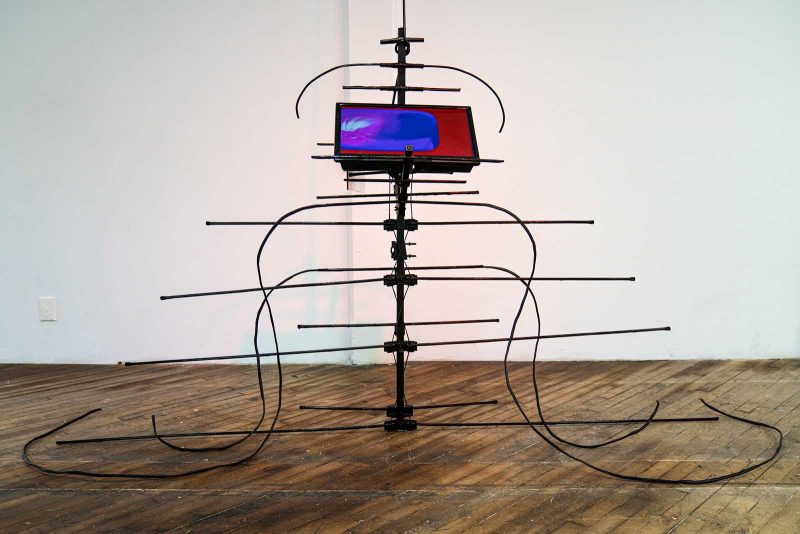
Similar changes of time and action can be seen in the work of Zach Hill and Shay Arick. Hill’s subtly shifting video monitor in “Screaming,” digitally recasts Munch’s The Scream utilizing a sunset background from the night of the 2020 U.S. presidential election, centering the protracted sense of anxiety and fear surrounding those results. Hill’s “Spiraling Jewel Girl,” takes this prolonged sense of dread even further, by mounting a screen of lights on top of a found and distorted rooftop TV antenna. The resulting object is something more organic––demonic, even––as if out of a horror movie.
[Ed. Correction: Zach Hill explained that the flashing lights in ‘Spiraling Jewel Girl’ were from a DJ installation at a rave, not police cars. The post has been corrected.]
Opposite, hangs Arick’s “Under One’s Hat,” a disembodied cowboy hat secured top-side to the wall. Peer through the cavity where one’s head would normally be, and you’ll find a short supercut of movie star wild-westerners whose mouths and eyes have been crudely retooled to speak an alternate, more placid dialogue. This not-quite-deep-fake slowly recalls early childhood memories of pretending to be a cowboy. Flanked on both sides are sections of a lasso rope, frozen stiff in the moment of being tossed, and, every once in a while, you will notice them twitch, like an ailing cough or a malfunctioning action figure toy. In this set of work, the aging symbols of a uniquely american masculine power have been reanimated (zombified, more like it) to offer what feels like an unending and pitiable final testament.
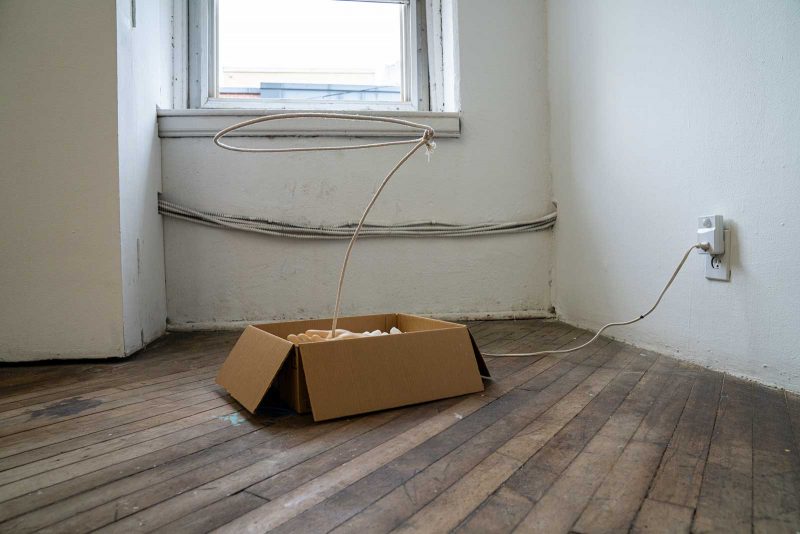
Comedy of Errors would, in fact, be funny––cartoonish, even––with its frightening symbols of patriarchal violence pacified through flowers and digital toys, were it not for the way it manages to foreground the feebleness of individual action. Video and sculptural memes might suggest subversion by poking fun at the U.S. military, or stiff cowboys of some past Hollywood golden era, or current political divisions, but that won’t put much of a real-life dent in what those things have been or will continue to become. Comedy of Errors wanders into many active and dynamic socio-political discourses but instead of moving along with these conversations, it decides to freeze completely. The effect is a morose triangulation of the epoch we find ourselves in, but its confidence in ending the story there feels incomplete, and encourages its audience to turn away from a shared, yet to be seen future.
‘Comedy of Errors: Shay Arick, Maggie Hazen, Zach Hill‘ curated by Meyken Barreto is on view through Sunday, July 18, 2021 at Vox Populi, 319 N 11th St #3, Philadelphia, 19107
